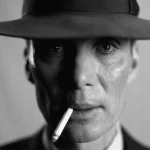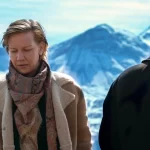Hell or High Water: Hell of a Disappointment, by Ian Brill
In the first few moments of David Mackenzie’s Hell or High Water, we see a blank wall adorned with the following graffiti: “3 tours of Iraq but no bailout for us.” Now, your humble critic has lived in both Los Angeles and San Francisco, and has seen every surface known to man hit by graffiti and tagging. I have never seen any graffiti written in full sentences and so direct. This gets to the heart of what’s wrong with Hell or High Water. When it tries to speak to real-life economic struggles of blue-collar Americans, such as those in the film’s setting of rural Texas and Oklahoma, it only feels more distance and less relatable. This element is never properly woven into the story, but patched onto what could have been interesting film.
The film follows Chris Pine and Ben Foster as they play bank robbing brothers Toby and Tanner, respectively. The opening robbery has them intimidating a teller played by Dale Dickey, a mainstay in stories about struggling Americana. There are touches of comedy as the two brothers appear to not think through their plan. One hopes the film would be a Texas-fried version of Dog Day Afternoon or even a modern Raising Arizona. Foster in particular is delivering a manic performance that veers between hollering and muttering, and could only work in such a film as those. Mackenzie does not deliver a black comedy. Instead, Hell or High Water marches on with a very serious tone, where Toby and Tanner’s spree of robberies is inspired by their economic situation, and their actions allow many side characters to drop in tin-eared comments about economic plight.
These comments all feel forced into the story. Like the graffiti at the beginning, they are polemics aching to appear real. Katy Mixon of Eastbound and Down plays the role of waitress and gets to be an avatar of the working-class single mom. Nothing ever feels too human. The exceptions are when Pine’s Toby meets with his estranged family. There, the politics are dropped and the smaller human story takes over. You see that there is a relatability in when a story is told specifically as opposed to when it is trying to be a larger statement on poetical issues.
The brothers are followed by two Texas Rangers, played by Jeff Bridges and Gil Birmingham. Bridges is delivering a performance that continues his trend of playing grizzled country-folk. It can work well in a film like True Grit, but here, in the absence of great material, it can seem like a surface-level attempt to get something out of a very one-note character. Bridges’ Ranger Marcus is an old-timer close to retirement. His attempts at good natured ribbing with his Native America partner only come off as awkward. Birmingham, as that partner, does not fare better. His biggest moment is when he has a monologue about how this land is being stolen once again, only now it’s being stolen by the banks. It’s another example of the characters trying to reach a message the filmmakers included, instead of acting natural.
The film ends on a strong note, when Pine and Bridges finally get to work together. Here, the film finally realizes the power of leaving things unsaid, and letting the actors’ respective presence play lead. It’s a great scene and one wishes that the rest of the film had this grace.































Oscar nominated!